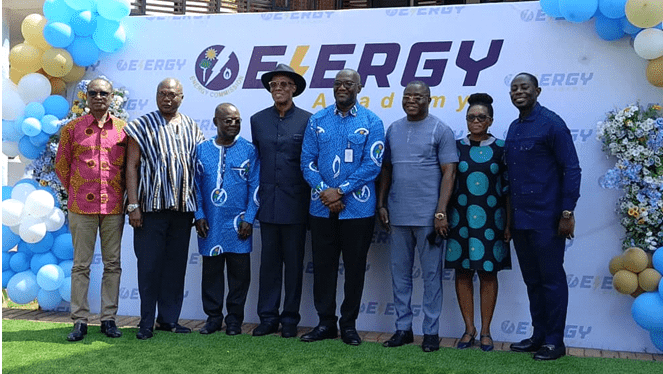By Juliet ETEFE ([email protected])
The Energy Commission has officially launched an Energy Academy, a pioneering platform to empower energy professionals across Africa with cutting-edge training and capacity-building initiatives.
The academy aims to deliver specialised and sustainable training in key areas such as energy policy formulation, energy planning, renewable energy, energy efficiency & conservation and technical regulation.
The academy is expected go beyond theoretical foundations taught in traditional school settings by developing solutions that will define the future of energy for our country, the entire region and beyond.
It therefore aspires to be the hub for energy education in Africa, providing cutting-edge training for energy sector professionals.
Also, by combining expertise with innovation, the academy seeks to strengthen capacities in local content, energy planning, electrical wiring, electric vehicles, renewable energy technologies, energy data analytics, energy efficiency & conservation, power systems and oil & natural gas regulation, equipping professionals to meet emerging challenges and seize new opportunities.
The launch, held at the newly commissioned Nearly Zero Energy Building, also marked the Energy Forum opening – which reflects on 30 years of energy sector reforms in Ghana.
Themed ‘Three Decades of Energy Sector Reforms in Ghana: Reflecting on Performance and Shaping a Sustainable Future’, the launch brought together key stakeholders including government officials, industry players and development partners to evaluate progress and chart a path toward an inclusive and resilient energy future.
Transformation
In his welcome address, Executive Secretary-Energy Commission Ing. Oscar Amonoo-Neizer highlighted the transformative journey of Ghana’s energy sector over the last three decades – noting that reforms have opened doors for private sector participation, enhanced energy access and promoted sustainability.
“These reforms have powered industries, driven economic growth and improved the quality of life for millions of Ghanaians. However, as we celebrate our achievements we must confront persistent challenges and chart a bold course toward a sustainable future,” he said.
“We acknowledge that collaboration has made our progress possible. The partnerships between government, private sector players, development agencies and civil society have been instrumental in shaping Ghana’s energy trajectory. Similarly, the Energy Academy’s success will depend on this same spirit of collective action,” he added.
He noted the pivotal role of skilled professionals in addressing the complex challenges of energy security, access and sustainability.
“The Energy Academy we launch today is a direct response to lessons from the past. We recognise that the cornerstone of a thriving energy sector is its people. Skilled professionals, empowered by knowledge and innovation, are essential to tackling the challenges of energy security, access and sustainability.
“The Academy will provide cutting-edge training, foster innovation and build capacity in energy policy formulation, renewable energy, energy efficiency, electricity and natural gas regulation, local content and electrical wiring certifications – all critical to realising our national energy goals,” he asserted.
Sustainable energy
A deputy Energy Minister, John Kobina Abbam Aboah Sanie who officially launched the Academy, described the dual events as milestones in Ghana’s energy journey.
“The Nearly Zero Energy Building that houses the Academy is a testament to Ghana’s unwavering commitment to sustainable development and innovation. The Energy Academy is designed to be a premier centre for learning, collaboration and innovation. It will play a pivotal role in positioning Ghana at the forefront of global energy developments,” he stated in a speech on behalf of the sector minister.
The minister underscored the country’s need to adapt in the rapidly evolving global energy landscape, which demands decarbonisation, technological innovation and sustainable solutions.
He called for collaborative efforts to address gaps in energy access and reliability while ensuring inclusivity and sustainability.
“The global energy landscape is evolving rapidly, with a strong push toward decarbonisation, technological innovation and sustainable energy solutions. For Ghana to remain competitive and resilient, we must adapt and innovate. The theme challenges us to evaluate past lessons, address the gaps and chart a bold course toward a future that balances growth, inclusivity and sustainability,” he remarked.
“Together, let us ensure that the next three decades of Ghana’s energy sector are defined by innovation, inclusivity and sustainability,” he added.
The academy will offer transformative training and certification programmes in partnership with institutions such as the Kwame Nkrumah University of Science and Technology (KNUST), Brew Hammond Energy Centre and international organisations.
It also boasts an electronic library, providing access to digital resources, eBooks and a platform for energy professionals to publish their work globally.
The Forum
The Energy Forum accompanying the launch provided an opportunity for stakeholders to evaluate three decades of progress in Ghana’s energy sector, with panellists advocating for strategic private sector participation.










